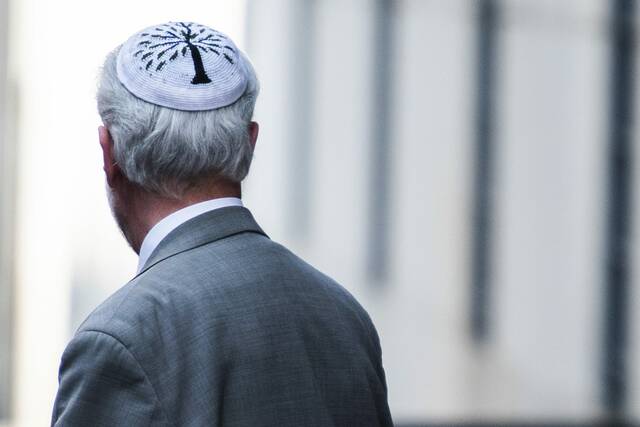For weeks, everyone in the courtroom had become accustomed to the pictures of the victims.
They were displayed frequently. State-issued ID photos, sometimes smiling, but often stoic, on a blue background.
On Monday, the pictures changed.
As the government told the jurors about each of the lives lost Oct. 27, 2018, they showed new pictures of each person.
They were joyful.
And beautiful.
And, once again, centered for the prosecution what the case is about.
“Each of the 11 is so much more than a victim of these horrific crimes,” said Assistant U.S. Attorney Nicole Vasquez Schmitt. “They had full lives. They were loved. They were unique.
“The pain and the loss are staggering.”
On Monday, the case against Robert Bowers moved into its final stage, where jurors will decide whether he lives or is sentenced to death.
It is the most highly anticipated part of the trial — the only one ever really in dispute — since the case started on May 30.
Bowers, 50, of Baldwin was found guilty of killing 11 members of the Tree of Life-Or L’Simcha, Dor Hadash and New Light congregations who were worshiping at the synagogue that day.
Killed were Rose Mallinger, 97; Bernice Simon, 84, and her husband, Sylvan Simon, 86; brothers David Rosenthal, 54, and Cecil Rosenthal, 59; Dan Stein, 71; Irving Younger, 69; Dr. Jerry Rabinowitz, 66; Joyce Fienberg, 75; Melvin Wax, 87; and Richard Gottfried, 65.
On Monday, the prosecution began the task of capturing each of those lives in a way to make the jurors understand exactly what was lost that day.
‘Absolute lust for life’
Richard Gottfried lived a motto: “We’re gonna do this while we can.”
He and his wife, Margaret “Peg” Durachko, graduated Pitt dental school together, then started a North Hills practice in 1984, where Gottfried became known for his warmth and gentle touch.
The couple moonlighted by offering free dental work to those without health care.
They counseled young couples preparing for their wedding vows.
They helped the less fortunate at a Squirrel Hill clinic where most families spoke no English.
Because, Gottfried believed, you do it while you can.
Gottfried, raised with three sisters in Uniontown, loved Pittsburgh sports and cherished his wine cellar. He enjoyed golfing and ran every year in Pittsburgh’s Great Race, his sister, Carol Black told the jury.
Most important, though, was his faith, which he rediscovered when his father died in 1992.
He prayed the Kaddish, a Jewish mourner’s prayer, every day for 11 months and attended New Light Congregation services regularly.
Gottfried never asked that Black join him for those services.
“But it was very clear to me he would be very happy if I found my way back into Judaism,” she said.
Black told the jury she and her brother had season tickets together for Pitt football, where he would often critique the marching band — hearkening to his own time in high school when he played the clarinet.
All four of the siblings and their spouses regularly attended Pittsburgh theater shows.
“It’s just such a huge void in our family for him not to be here,” Black said.
Durachko, who is Roman Catholic, spoke lovingly about his determination and “absolute lust for life.”
In January 2018, Gottfried slipped on black ice in their driveway, requiring surgery to repair the quads in both legs. He was in straight-leg casts until late April.
The couple had booked a cruise to the Greek Isles for June and wondered if they should cancel.
Gottfried was determined to be able to go on the trip unaided. He made it.
Durachko proudly described an image displayed for the jury showing her husband from a distance, wearing a bright white shirt, standing at the top of the Parthenon.
He packed his cane but never needed it.
After her husband died, Durachko shuttered their dental office — a premature retirement.
“It wasn’t any fun anymore to practice — half of me was gone,” she said.
The couple expected to retire and travel and live to an old age.
“My whole world was turned upside-down,” she said. “We never had children. He was my whole family. And it was wiped out in a second.”
‘The best thing that ever happened to me and my entire family’
Joy and Elie Rosenthal fought hard to keep their boys at home. It was the 1960s when they learned that Cecil and David had Fragile X syndrome, causing intellectual disabilities.
It was common at the time, Diane Rosenthal told the jury, to institutionalize someone with that type of disability. But her parents refused.
“It was really important to my parents we grow up in the same household,” she said. “My parents fought long and hard to keep them at home.”
Even though it was often hard — “the boys,” as they were affectionately known, had the mental capacity of preschoolers — the family stayed together, Diane Rosenthal said.
“It was probably the best thing that ever happened to me and my entire family.”
Cecil was incredibly social, she told the jury, even from a young age. He often sat on the family’s front porch with their mom gossiping with the other ladies from the neighborhood.
“He always just had a zest for life,” she said.
David was shy until he became comfortable, his sister continued, and then he wanted to be part of the group.
He loved games and learned how to ride a bike.
As they became adults, Cecil learned to take the bus and worked as a mail courier for Achieva. David, who also loved going to the fire station, enjoyed cleaning and held several jobs doing that.
“They were really proud of what they were able to do,” their sister said.
The brothers enjoyed being uncles to Diane’s two daughters, Li Wen and Jennifer, and were incredibly gentle with them.
She narrated for the jury photos of them as they posed with the girls as small children and in later years.
The most important things to both men were faith and family. They attended services every Friday night and Saturday morning.
Diane Rosenthal told the jury her brothers’ deaths took an enormous toll on their parents, who are now 91 and 85, and have been unable to attend the trial.
“My parents gave 100% of themselves to my brothers,” she said. “What a privilege it was for my parents to take care of the boys.”
Joy Rosenthal read a video recorded statement for the jury. In it, she spoke lovingly of her sons, always keeping her composure.
As it played on the monitors in the courtroom, at least six jurors wiped tears from their eyes.
As adults, Cecil and David lived in a group home and relished the weekends when they would go to stay with their parents at their condominium.
“We could hear them thundering down the hallway,” their mom said.
David was always eager to help her in the kitchen, while Cecil would sit with her husband.
She described their joy at participating in services at Tree of Life.
“You have never seen two more proud individuals,” she said. “We felt so honored to be their parents.”
As for the impact on their family, Diane continued, it’s changed her life completely.
“They were the glue that kept our family together,” she said. “These boys taught us way more than we will ever be able to teach them.”
Joy Rosenthal said the impact is immeasurable.
“I woke up in the morning with two loving sons,” she said. “I went to bed that night with only memories.”
‘I knew to my core how much he loved me’
Melvin Wax never had it easy.
His father died young, and Wax grew up moving frequently around Pittsburgh with his mother, who suffered from mental illness. Unable to work, she raised her son on welfare checks and hope.
At 12, Wax took a job to support the family. He was drafted into the Army and served in Germany during the Korean War, He kept his Judaism to himself, his daughter, Jodi Kart, testified Monday.
“He was very much aware of antisemitism, and I was raised that way, as well,” she said. “He lived it. He had witnessed the Holocaust.”
The G.I. bill later sent Wax to Robert Morris University, where he studied accounting, and helped him buy a house.
He worked six days a week as a comptroller at a small steel-drum company. He’d take Kart with him to work Saturdays, wanting her to follow in his footsteps.
“The first thing I think about when I think about my dad is unconditional love — he was just a gentle man,” Kart said. “I knew to my core how much he loved me.”
After his wife of 50 years died, Wax felt lost.
But Kart was there for him. And so was New Light Congregation, whose services he attended Fridays, Saturdays and Sundays.
“Faith and family — those were the two most important things to him,” Kart said. “It defined who he was as a person.”
His love extended a generation — Kart showed jurors multiple photos of Wax smiling wide while holding his grandson, with whom he loved to play games like Scrabble and Monopoly.
“He never got to see his grandson graduate from college,” Kart said. “I think about him every day. I lost my mom in 2016, and I can say this is very different than losing my mom.”
SWAT officer testifies
As part of victim impact testimony, the government also called Pittsburgh SWAT Officer Anthony Burke. He was shot in the right wrist as he reached into an upstairs classroom of the synagogue to help drag wounded officer Timothy Matson to safety during the attack.
He told the jury that his ulna was fractured, two bones in his wrist were destroyed, along with his ulnar nerve.
“I thought they were going to amputate my hand,” he said.
Burke had trauma surgery that day and another the next. Then, he said, after months of occupational therapy, he learned that his nerve wasn’t working.
He had another surgery in which a cadaver nerve was placed in his arm.
That one didn’t work either. During the months of therapy and recovery, Burke said, he became cynical. He didn’t want to leave his house, and his relationship with his wife became strained, he told the jury, tearing up.
Finally, in July 2019, he had another surgery in which doctors moved a tendon from his leg into his arm and overrode the ulnar nerve.
He regained about 80% of the use of his hand — enough to be able to return to work, but not enough to stop him from hesitating each time he has to use it.
“It’s just something I’m going to have to live with for the rest of my life.”
‘Hold him accountable’
The court day began with opening statements, with the prosecution and defense staking out their positions.
“You already know that the death penalty is the only sentence that will hold him accountable,” Vasquez Schmitt told the jury Monday morning.
The prosecution painted the defendant as a remorseless mass murderer whose difficult childhood and past mental health issues do not outweigh his methodical planning in the attack or the weight of the numerous lives lost and affected.
“The defendant made the decision to kill again and again and again and again — 11 times,” Vasquez Schmitt told the jury. “Now, it is time to hold him accountable for his decisions.”
But defense attorney Elisa Long countered in her opening, painting a complicated picture of the trauma Bowers experienced as a child.
Fear, anxiety, depression. Mental health commitments. Suicide attempts, frequent fights with parents and grandparents.
Housing instability and food insecurity.
A father who committed suicide. A mother who struggled with her mental health.
“On more than one occasion, she told her son, ‘I wish you had never been born,’” Long recounted.
All of that chronic exposure to trauma, the defense attorney continued, damages a child’s sense of self.
“Each risk factor … compounds and worsens the likelihood of further risk and adversity,” she said.
The defense will argue 112 mitigating factors to try to convince the jury why a sentence of life in prison, “every single minute, every single hour, every single day,” is the right one.
Long repeated three times during her opening that the law never requires a sentence of death, and never presumes one either. Further, she told the jurors to maintain their individual beliefs — the law does not require them to do “violence to their conscience.”
It is, she said, “ultimately a personal judgment each of you must make.”
Long told the jury the defense is not looking to excuse what their client did.
“You should punish him,” she said. “Look deep in your heart and conclude ‘enough is enough.’ There has already been enough death. And another death will never make things right.”











